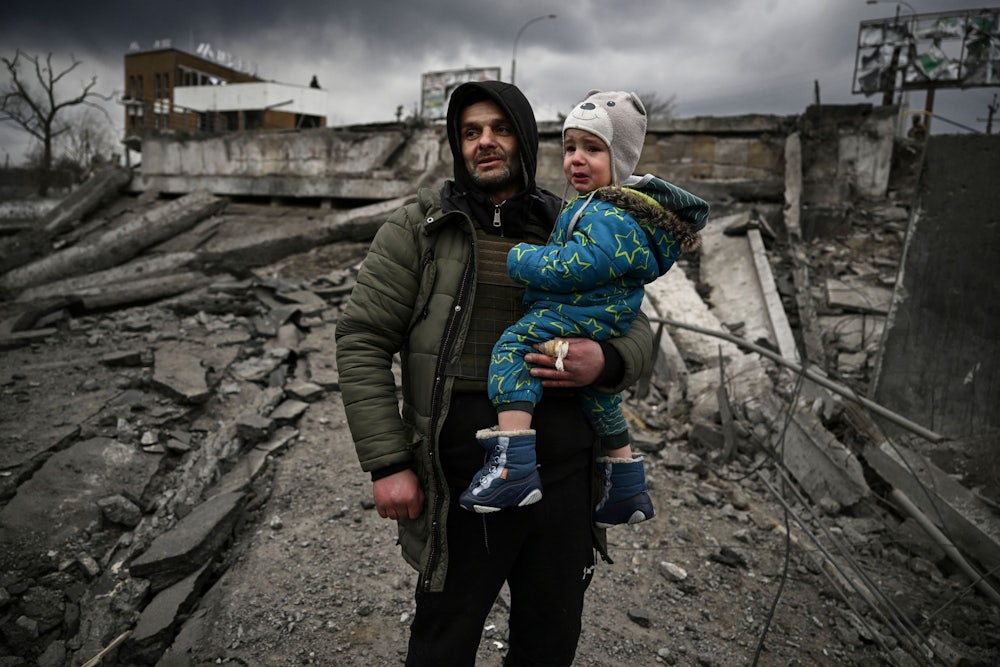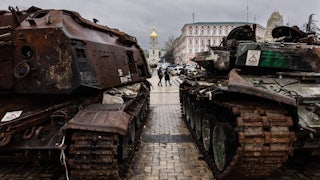When Russia launched its invasion of Ukraine a year ago today, hardly anyone would have imagined that the war there would now still be underway. Though we cannot predict when or how the war might end, it seems certain that Russia will not succeed in subjugating and recolonizing Ukraine. Also, it is evident that Russia has succeeded in greatly strengthening the Western alliance and in ensuring its determination to resist Russian aggression.
Reporting from the Munich Security Conference last week, The New York Times ran a headline: “Allies Vow to Help Kyiv ‘As Long as Necessary.’” At Munich, Britain’s Prime Minister Rishi Sunak, France’s President Emmanuel Macron, and Germany’s Chancellor Olaf Scholz all made such commitments. Their statements in Munich were quickly followed by President Biden’s surprise visit to Kyiv, where he said, “I thought it was critical that there not be any doubt, none whatsoever, about U.S. support for Ukraine in the war.”
Of course, it is depressing to know that without such commitments, Russia’s aggression and its crimes against humanity would surely be rewarded. At the same time, however, it is heartening, in part because it is such a contrast to what Western governments did a generation ago when faced with the aggression and the crimes against humanity of Slobodan Milošević in the former Yugoslavia.
Though scores of thousands of civilians and combatants have been killed in Ukraine, many more have been injured, and millions have been forcibly displaced, comparable numbers endured such suffering in the former Yugoslavia. Yet governments such as those of France and the U.K. strenuously resisted any military support for the Bosnians who were at the top of the list of Milošević’s victims. They imposed an arms embargo on all sides, which left the Bosniaks without weapons while the Bosnian Serbs who attacked them had the weapons of Milošević’s Yugoslav Army.
As for the U.S., it took several years before it intervened, but only after such atrocities as the genocidal massacre of some 8,000 men and boys at Srebrenica.
Speaking on behalf of the United States at the Munich Security Conference, Vice President Kamala Harris accused Russia of committing “crimes against humanity” in Ukraine. This also contrasted with the way that top officials of the U.S. addressed the crimes that were committed a generation earlier in the wars in the former Yugoslavia.
Crimes against humanity are especially grave crimes. By definition, they are crimes that are committed on a large scale. They are widespread and systematic crimes. Necessarily, they involve high-level officials who have the authority to direct the commission of such crimes. The top Nazi officials tried at Nuremberg after World War II were prosecuted for crimes against humanity. The Rome statute establishing the jurisdiction of the International Criminal Court specifies the crimes that constitute crimes against humanity.
Though crimes against humanity were also committed in the wars in the former Yugoslavia, for a number of years top officials of the U.S. and other Western governments considered it prudent not to discuss this. Early in the war in Bosnia, the U.S., led by Madeleine Albright when she was Ambassador to the United Nations, had helped to persuade the U.N. Security Council to create the International Criminal Tribunal for the Former Yugoslavia, or ICTY. Thereafter, however, for a period of years, leaders of the U.S. and other Western governments gave the ICTY scant support, apparently because they feared that the prospect of criminal trials for war crimes and crimes against humanity would get in the way of reaching an agreement that would bring an end to the conflict. Supporters of the ICTY were concerned that it would be either abolished or underfunded in a way that would make it impossible to function.
Even after the war in Bosnia ended in 1995, NATO troops there as peacekeepers long avoided making arrests of indicted war criminals they encountered, apparently in an effort not to antagonize the Bosnian Serbs.
Vice President Harris’s speech in Munich is a welcome indication that the U.S. is now on a different path. The International Criminal Court has had investigators on the ground in Ukraine collecting evidence of war crimes and crimes against humanity. It seems likely that indictments will be issued before much more time passes. When they are issued, they will cause a great stir. Having the U.S. firmly on record in support of the Court is an important development.
Another speaker at the Munich conference was Ursula von der Leyen, president of the European Commission, speaking on behalf of the European Union. Among other things, she said that it is “unthinkable” that Russia would not have to contribute to the reconstruction of Ukraine. This, too, was a contrast to what happened in the former Yugoslavia. Though Serb forces caused immense damage in Bosnia, Croatia, and Kosovo, the question of paying for reconstruction never became an issue. One way that Russia could be made to pay for some portion of the reconstruction required in Ukraine would be to use assets seized in connection with the sanctions imposed on Russia.
The determination and unity of the Western powers in resisting Russia’s invasion of Ukraine must have come as an unpleasant surprise to the war’s author, President Vladimir Putin. It is impossible, of course, to replay history and imagine what would have happened if the wars of the 1990s in the former Yugoslavia had followed a different trajectory. Yet it seems possible that if the governments of the U.K., France, Germany, the U.S., and the other governments of the NATO alliance had been comparably resolute a generation ago, Putin might have been more hesitant to launch his awful war in Ukraine to begin with.






